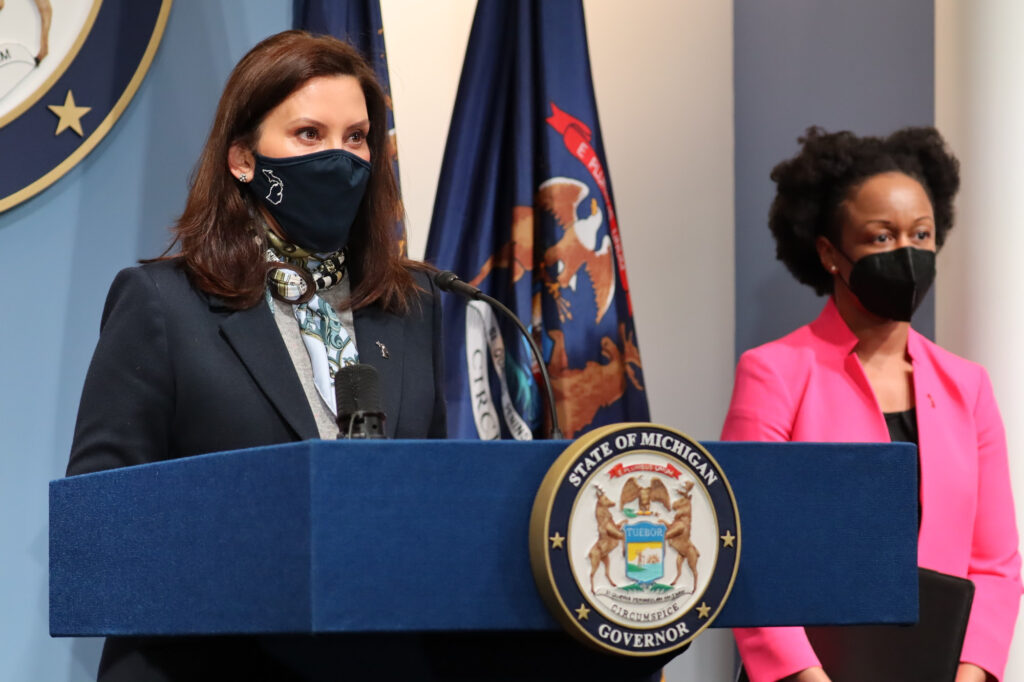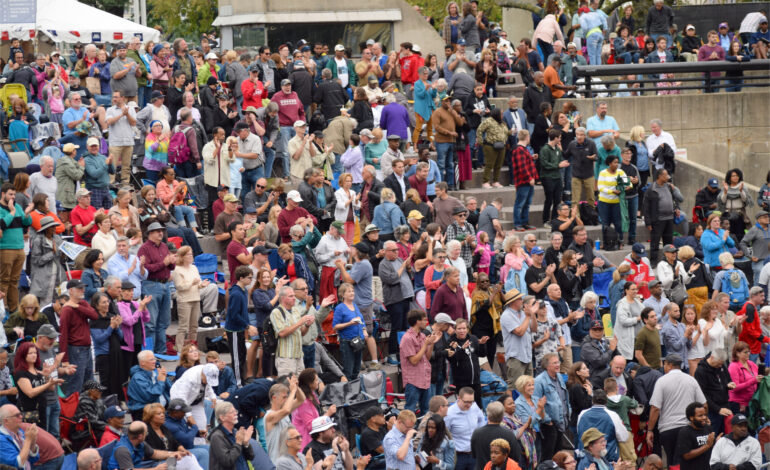LANSING — Michiganders can look forward to coming months of normalcy, if they are willing to get an appointment to get a COVID-19 vaccine to help the state get to its 70 percent vaccination goal.
Governor Whitmer has laid out a plan for the state to return to normal based on vaccination rates. The “MI Vacc to Normal” plan will use four vaccination-based milestones, using data for Michiganders 16-years-old or older who’ve received their first dose, to guide future steps required to open up the state:
- 55 percent of Michiganders (4,453,304 residents), plus two weeks:
– Allows in-person work for all sectors of business - 60 percent of Michiganders (4,858,150 residents), plus two weeks:
– Increases indoor capacity at sports stadiums to 25 percent
– Increases indoor capacity at conference centers/banquet halls/funeral homes to 25 percent
– Increases capacity at exercise facilities and gyms to 50 percent
– Lifts the curfew on restaurants and bars - 65 percent of Michiganders (5,262,996 residents), plus two weeks:
– Lifts all indoor percent capacity limits, requiring only social distancing between parties
– Further relaxes limits on residential social gatherings - 70 percent of Michiganders (5,667,842 residents), plus two weeks:
– Lifts the Gatherings and Face Masks Order such that the MDHHS will no longer employ broad mitigation measures unless unanticipated circumstances arise, such as the spread of vaccine-resistant variants

Image courtesy: Office of the Governor
As of Thursday, the state has administered 6,657,997 vaccines. Currently, 48.8 percent of Michiganders ages 16 and older have received at least one dose, with 35.9 percent of Michiganders ages 16 and older having been fully vaccinated, meaning the state is surely on its way to reaching that goal of getting at least one dose into 70 percent of its population.
As far as reaching the set vaccine milestones, based on how many people are vaccinated, Whitmer said “things are proceeding as anticipated” and that vaccine supplies are now strong enough to meet demand.
“Back to normal”
The rationale behind announcing this plan has partly to do with progress in COVID-19 case numbers. Michigan’s daily rates have dropped from 649.9 cases per million to 439.3 cases per million, the percent of positive tests has declined from 18.3 percent to 13.2 percent and the number of hospitalizations has fallen from 3,780 to 3,520.
Large scale vaccine availability is also a factor in tying future reopening plans to vaccine numbers in the state. Whitmer said on Thursday that Pfizer has applied for the right to vaccinate people ages 12- 15-years-old, which could further affect these milestones.
“When younger kids become eligible, we’ll continue to push our energy and our efforts to making sure that they get vaccinated as well and that, ultimately, our work will not be done when we hit one of these goals, but that we can enjoy a lot of things that we’ve all be craving when we do,” Whitmer said.
As of Thursday afternoon’s counts by the New York Times, which catalogs cases per 100,000, Michigan is no longer the worst in the country for daily averages, Florida having taken over that title. Michigan is still a COVID-19 hotspot and leads the country in hospitalizations and deaths per 100,000, according to the numbers collected by the Times.
The state’s officials are now laying their hopes on pumping up vaccination numbers to restart much of Michigan’s economic activity, if potential vaccine-resistant variants of the COVID-19 don’t become a problem. State models suggest Michigan could get to the first step in the plan over the next seven to 10 days, Whitmer said on Thursday. Fourteen days later, initial restrictions under that first step would be lifted.

Governor Whitmer and Dr. Joneigh Khaldun. Photo: Office of the Governor
I encourage you to rise to the challenge and be a part of the solution, so we can continue our economic recovery and have the summer we all crave — Governor Whitmer
For the “MI Vacc to Normal” plan, the state says that if new cases remain greater than 250 daily/million as a seven-day average in a Michigan Economic Recovery Committee (MERC) region at the time of implementing steps two through three of the plan, the state’s health authority may delay implementation in that MERC region.
“The safe and effective vaccine is the most important tool we have to reduce the spread of COVID-19,” said Dr. Joneigh Khaldun, the state’s chief medical executive and chief deputy for health. “By getting shots in their arms as soon as possible, Michiganders can protect themselves, their families and their communities and help end this pandemic as quickly as possible.”
“The MI Vacc to Normal challenge outlines steps we can take to emerge from this pandemic as we hit our vaccination targets together,” Whitmer said. “On our path to vaccinating 70 percent of Michiganders 16 and up, we can take steps to gradually get back to normal while keeping people safe. If you haven’t already, I encourage you to rise to the challenge and be a part of the solution, so we can continue our economic recovery and have the summer we all crave.”
Michiganders have been getting their second doses of the Pfizer or Moderna vaccine at a rate of 96.4 percent above the national average. Michigan also recently reached a vaccination milestone in record time: Administering more than 6 million doses, with the latest 1 million doses being administered in 11 days.
To get in line with recent changes to mask guidelines for outdoor gathering for smaller groups with fully vaccinated people, the state is expected to update its outdoor gathering rules on Friday.






Leave a Reply